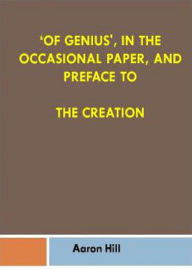'Of Genius', in The Occasional Paper, and Preface to The Creation: A Religion, Post-1930 Classic By Aaron Hill! AAA+++ BDP Editor
by BDP
2020-05-07 20:35:05
'Of Genius', in The Occasional Paper, and Preface to The Creation: A Religion, Post-1930 Classic By Aaron Hill! AAA+++ BDP Editor
by BDP
2020-05-07 20:35:05
Excerpt:The anonymous essay Of Genius, which appeared in the Occasional Paper of 1719, still considers genius largely a matter of aptitude or talent, and applies the term to the mechanick as well as the fine arts. The work is, in fact, essentially a ...
Read more
Excerpt:The anonymous essay Of Genius, which appeared in the Occasional Paper of 1719, still considers genius largely a matter of aptitude or talent, and applies the term to the mechanick as well as the fine arts. The work is, in fact, essentially a pamphlet on education. The author's main concern is training, and study, and conscious endeavor. Naturally enough, his highest praise--even where poetry is in question--is reserved for those solid Augustan virtues of judgment and good sense.And yet the pamphlet reveals some of the tangled roots from which the later concept of the original or primitive genius grew. For here are two prerequisites of that later, more extravagant concept. One is the author's positive delight in the infinite differences of human temperaments and talents--a delight from which might spring the preference for original or unique works of art. The other is his conviction that there is something necessary and foreordained about those differences: a conviction essential to faith in the artist who is apparently at the mercy of a genius beyond his own control. The importance of this latter belief was long ago indicated in Paul Kaufman's Heralds of Original Genius.While his tone is perhaps more exuberant than that of most of his immediate contemporaries, there is nothing particularly new in our author's interest in those aspects of human nature which render a man different from his fellows. It is true that the main stress of neoclassical thought had rested on the fundamental likeness of all men in all ages, and had sought an ideal and universal norm in morals, conduct, and art. But there had always been counter currents making for a recognition of the inescapable differences among various races and individuals. Such deviations were often merely tolerated, but toward the close of the seventeenth century more and more voices had praised human diversity. England, in particular, began to take notice of the number of originals abounding in the land.
Less


















.jpg)






.jpeg)




